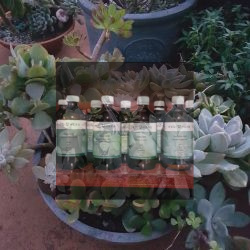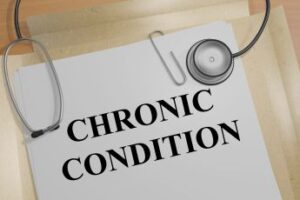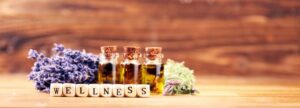Anxiety
 There are several ways to manage and relieve anxiety naturally safely using herbs, supplements, exercise and sleep hygiene. Many people underestimate the role of the brain in anxiety. Brain chemicals like Serotonin, Dopamine, Glutamate and GABA are neurotransmitters (chemicals that transmit electrical signals across gaps in our brain and nervous system). They all affect how our brains see the world around us and decide whether an event is benign or stressful. If there is not enough of these neurotransmitters’ negative emotional states can occur. This leads to anxiety which can negatively effect every area of our lives.
There are several ways to manage and relieve anxiety naturally safely using herbs, supplements, exercise and sleep hygiene. Many people underestimate the role of the brain in anxiety. Brain chemicals like Serotonin, Dopamine, Glutamate and GABA are neurotransmitters (chemicals that transmit electrical signals across gaps in our brain and nervous system). They all affect how our brains see the world around us and decide whether an event is benign or stressful. If there is not enough of these neurotransmitters’ negative emotional states can occur. This leads to anxiety which can negatively effect every area of our lives.
Herbs and Supplements
- Passionflower: has been noted for its effectiveness on anxiety states, whether the anxiety is due to a stressful situation such as surgery or work and the effectiveness on its outcome in hypertension (raised blood pressure). Passionflower has few, if any, side effects, unlike herbs such as Valerian which is known to cause grogginess.
- Withania: or Ashwagandha is an adaptogen (an herb that supports the body during stressful events that include emotional, physical, and environmental states). Withania has been studied and found to have “…improved anxiety and stress in all studies undertaken to date”.
- Kava: Is a well-known plant in the Fijian Islands that is “…used to treat kidney and bladder troubles”. Kava has been studied for the effect of its lactones (active chemicals) on anxiety and found to be effective especially where anxiety leads to insomnia.
- Chamomile: soothing for the nervous system and relaxes the stomach where there is pain/cramping around the stomach area.
- B Vitamins: There has been research done to show that anxiety states have been improved by using high dose multi B supplements for the duration of 6 months. B vitamins can be activated before they are ingested – in supplements like Bioceuticals Mega B or Eagle Pharmaceuticals Tresos B. This means that the B vitamin does not require an enzyme to convert it to a useable form to be absorbed by the target cell. That way the B vitamin goes pretty much straight into the cell ready to be used instead of circulating around the body before being made useful by other vitamins or an enzyme or factor like intrinsic factor.
- Magnesium: Is widely used for cramping muscles especially when it occurs at night. What is less well known is magnesium’s role in alleviating anxiety symptoms and encouraging sleep. The funny thing here is that magnesium has a role in maintaining cellular energy, the background energy that keeps our muscles from dragging on the ground, and yet it helps to give a deep and sound sleep. When considering how to self-treat anxiety, magnesium complexes with multi B vitamins is a good and easy place to start. Dosage is 300mg of magnesium and around 50mg of each B vitamin, a little more than what you find in an everyday multi vitamin that happens to contain B vitamins and magnesium.
- Zinc: Is an amazing mineral that is versatile and has actions across body systems. These include the immune system, reproductive system (especially in men), skin, and the brain. According to Henry Osiecki, founder of Bio Concepts (a natural practitioner support company that produces the practitioner brand Orthoplex) zinc can be used for depression, apathy and where stress causes a zinc deficiency. Dosage should be 25-40mg per day. If you get a metallic taste in your mouth you do not need more zinc, in fact you might be getting too much. Foods that can increase your zinc are pepitas (pumpkin seeds – not salted), egg yolk, sea food, beef, milk and ginger.
 Practitioner only products, obtained from either your naturopath or a pharmacy, contain enough of these herbs, vitamins, and minerals to support treatment for anxiety. Practitioner products undergo rigorous quality assurance covering identity and purity – this ensures quality and efficacy. Wherever possible herbs are organically grown and wild crafted.
Practitioner only products, obtained from either your naturopath or a pharmacy, contain enough of these herbs, vitamins, and minerals to support treatment for anxiety. Practitioner products undergo rigorous quality assurance covering identity and purity – this ensures quality and efficacy. Wherever possible herbs are organically grown and wild crafted.
Wholistic Care
Herbs and supplements help to combat anxiety. They relieve the symptoms that occur because of anxiety and prevent subsequent inflammation and muscle pain from prolonged anxiety or stressful states of mind.
Another way of combating anxiety is to exercise regularly. Exercise helps maintain a positive mood, relieves tension and stress. Choose somewhere that you feel relaxed such as bush walking, walking through a shopping centre or along a beach. Exercise classes such as pilates, gym or aqua also has the added benefit of social interaction.
Good sleep can also help prevent anxiety. It must be no less than 6 hours and no more than 10 hours, or else you will be too tired or not getting quality sleep. If you are not getting quality sleep check with your doctor if you have iron deficiency, sleep apnoea, arthritis, or arthritic conditions. Sleep hygiene includes the area you have designated for sleep – bedroom and bed – are conducive to good sound sleep. The pillow should be supportive but not to high, the bed should be firm but not hard, the bedding needs to be cooling (so no hot blankets in summer and nothing that will cause you to sweat in winter), make sure that the room is dark as this increases melatonin (street lamps have been known to disrupt sleep and any blue light should be removed from the bedroom), even the small green or red light on mobile phones register on our eye receptors so keep those lights covered.
Massage will loosen tight muscles and essential oils help the nervous system to relax – oils such as lavender, rose geranium, and citrus oils like mandarin, lemon, and grapefruit.
By using the correct herbs and supplements along with exercise, sleep hygiene, massage you can manage and alleviate stress. Does your team include a naturopath to ensure balance; utilising optimal lifestyle and correct use of herbs and supplements. Jen Alder is happy to answer questions and help you plan a future with controlled stress.
 One of the greatest difficulties in life is when your doctor tells you that you have a chronic condition. A chronic condition can be diagnosed at any time but most often it is the result of years of:
One of the greatest difficulties in life is when your doctor tells you that you have a chronic condition. A chronic condition can be diagnosed at any time but most often it is the result of years of: